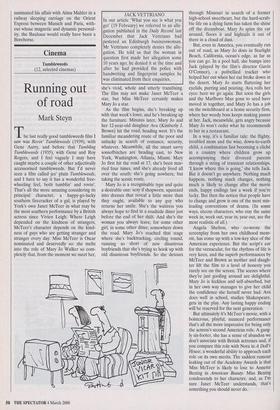Cinema
Tumbleweeds
(12, selected cinemas)
Running out of road
Mark Steyn
The last really good tumbleweeds film I saw was Rovin' Tumbleweeds (1939), with Gene Autry, and before that Tumbling Tumbleweeds (1935), with Gene and Roy Rogers, and I feel vaguely I may have caught maybe a couple of other adjectivally accessorised tumbleweeds. But I'd never seen a film called jes' plain Tumbleweeds, and I have to say it has a wonderful free- wheeling feel, both tumblin' and rovin'. That's all the more amazing considering its principal character, a happy-go-lucky southern firecracker of a gal, is played by York's own Janet McTeer in what may be the most southern performance by a British actress since Vivien Leigh. Where Leigh depended on the kindness of strangers, McTeer's character depends on the kind- ness of guys who are getting stranger and stranger every day. Miss McTeer is Oscar nominated and deservedly so: she melts into the role of Mary Jo Walker so com- pletely that, from the moment we meet her, she's vivid, whole and utterly transfixing. The film may not make Janet McTeer a star, but Miss McTeer certainly makes Mary Jo a star.
As the film begins, she's breaking up with that week's loser, and he's breaking up the furniture. Minutes later, Mary Jo and her 12-year-old daughter Ava (Kimberly J. Brown) hit the road, heading west. It's the familiar meandering route of the poor and unlucky in search of romance, security, whatever. Meanwhile, all the smart savvy sonsofbitches are heading east, to New York, Washington, Atlanta, Miami. Mary Jo first hit the road at 17, she's been mar- ried four times, and she's already lived all over the south: she's going nowhere, but taking the scenic route.
Mary Jo is a recognisable type and quite a desirable one: sexy if shopworn, squeezed into dresses that reveal a little more than they ought, available to any guy who returns her smile. She's the waitress you always hope to find in a roadside diner just before the end of her shift. And she's the woman you always leave, for some other girl, in some other diner, somewhere down the road. Mary Jo's reached that stage where she's backtracking, circling round, running so short of new disastrous boyfriends that she's trying to hook up with old disastrous boyfriends. So she detours through Missouri in search of a former high-school sweetheart, but the hard-scrab- ble life on a dying farm has taken the shine off the dreamboat. Mary Jo spins the car around, floors it and hightails it out of there in a cloud of dust.
But, even in America, you eventually run out of road, as Mary Jo does in Starlight Beach, California, ocean's edge, as far as you can go. In a pool hall, she bumps into Jack (played by the film's director Gavin O'Connor), a potbellied trucker who helped her out when her car broke down in the desert. Mary Jo starts fluttering her eyelids, purring and pouting. Ava rolls her eyes: here we go again. But soon the girls and the Marlboro Man gone to seed have moved in together, and Mary Jo has a job on the switchboard at a home security firm, where her weedy boss keeps making passes at her. Jack, meanwhile, gets angry because Mary Jo won't order what he recommends to her in a restaurant.
In a way, it's a familiar tale: the flighty, troubled mom and the wise, down-to-earth child, a combination fast becoming a cliché in a country where children grow up accompanying their divorced parents through a string of transient relationships. `I know where this is going,' she tells Jack. But it doesn't go anywhere. Nothing much happens, nothing much changes, nothing much is likely to change after the movie ends, happy endings last a week if you're lucky. But then the notion that people have to change and grow is one of the most mis- leading conventions of drama. (In some ways, sitcom characters, who stay the same week in, week out, year in, year out, are the most realistic of all.) Angela Shelton, who co-wrote the screenplay from her own childhood mem- oir, has come up with a low-key slice of the American experience. But the script's ear for the vernacular, for the rhythms of life is very keen, and the superb performances by McTeer and Brown as mother and daugh- ter lift the film to a level of honesty you rarely see on the screen. The scenes where they're just goofing around are delightful. Mary Jo is feckless and self-absorbed, but in her own way manages to give her child the confidence she herself never had. Ava does well in school, studies Shakespeare, gets in the play. Any lasting happy ending will be reserved for the next generation.
But ultimately it's McTeer's movie, with a boisterous, playful, nuanced performance that's all the more.impressive for being only the actress's second American role. A gang- ly six-footer, she has a sense of abandon we don't associate with British actresses and, if you compare this role with Nora in A Doll's House, a wonderful ability to approach each role on its own merits. The saddest rumour leaking out of the Academy Awards is that Miss McTeer is likely to lose to Annette Bening in American Beauty. Miss Bening condescends to her character, and, as I'm sure Janet McTeer understands, that's something you should never do.


































































 Previous page
Previous page